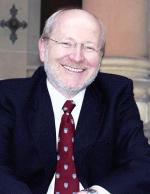McWha's Words
Golden Years Each year the University of Adelaide holds a number of reunions, enabling our graduates to celebrate their achievements since Graduation Day in Bonython Hall, and reaffirming their lifelong link with the university and its history. Last month we had the 20-Year Reunion, this month sees the 30-Year Reunion (on September 11), and soon we will see the latest of our Golden Jubilees, the 50-Year Reunion for graduates of 1954. This celebration, to be held on October 1, marks a very special milestone for our alumni and for the university. A student's time at university is often considered to be among their "golden years", and no doubt those attending the reunions will reflect fondly on their time at university. For those attending the Golden Jubilee, this takes on a new meaning. It is widely believed that our graduates from 50 years ago studied during a golden age, at a time when names like Mawson, Jordan and Kerr Grant were such a major presence on campus. Of course, they are still a major presence today, through the Mawson laboratories, the Jordan building and the Kerr Grant lecture theatre, to name just a few. Their efforts also had a lasting legacy, through their research and through the many students whose lives they touched, shaped and changed. But in many ways, despite or even because of the difficulties and challenges facing universities in today's modern age, these are also golden years for the University of Adelaide. The quality of our students and our research is world class, we continue to make a lasting impact on our students and the community around us, and we continue to see great achievements from our staff, students and graduates. There have been some extremely public examples of this recently, but none bigger than the Olympic Games in Athens. I'm sure that many alumni who once played sport for their alma mater will be interested to know that students from the University of Adelaide have been playing their part as athletes in both the 2004 Olympics and the Paralympics. These students represent the quality of all our students here at the university - those who are committed to wider interests, such as sport, as well as academic achievement, making them well-rounded individuals. The university was rightly proud of such students 50 years ago, and we are still proud of them today (the results can be seen not just from the recent Games but also among our 96 Rhodes Scholars). In addition to such fine, athletic students, the University of Adelaide has again played a major role in the development of the flames for the Athens Games, just as we did for Sydney in 2000. Working for industry partner FCT-Combustion, based at Thebarton, the university's engineering staff and students were involved in the creation of the flames for the Olympic torch relay, the spectacular rings of fire seen during the opening ceremony, and the main stadium cauldron in Athens. These flames serve as a symbol of the Olympic spirit; for us, they are a vivid example of the excellence that exists in Adelaide. Hundreds of millions of people right around the world have seen the results of our work, and that's a golden result we should all be proud of. PROFESSOR JAMES A. McWHA
Vice-Chancellor
|





